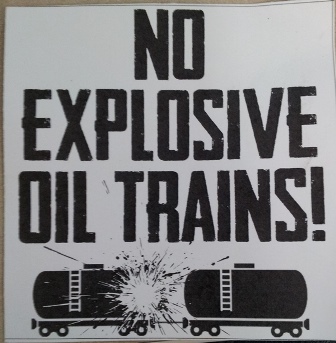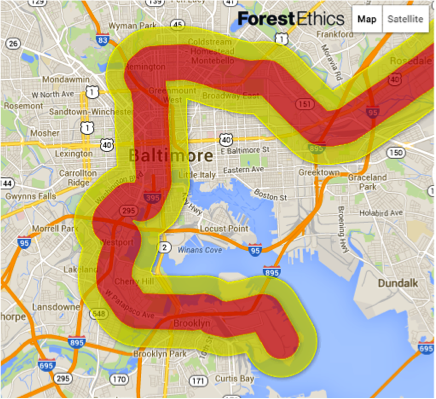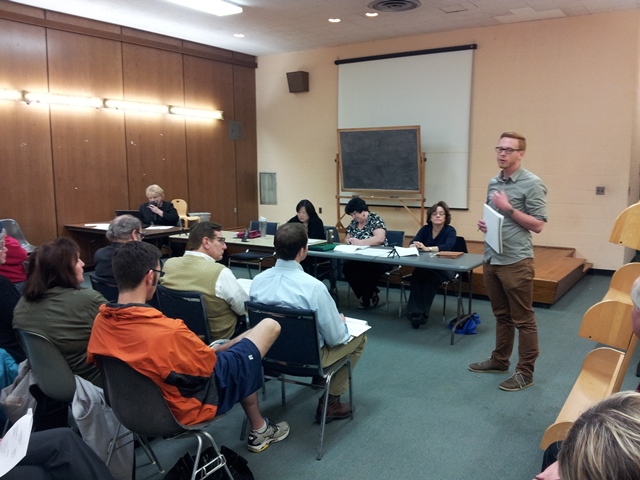"Residents are extremely concerned - it's not as if this is one oil train car here and there, the entire train will be full of oil cars."
Those are the words of East Baltimore resident Clare Palmieri, who spoke at a Maryland Department of the Environment public meeting Tuesday night regarding an air permit for a proposed oil export facility in South Baltimore. Close to 30 people  gathered at the public meeting in the Brooklyn neighborhood of Baltimore. And except for the rep from Targa -- the company applying for the permit -- everyone who spoke opposed the project.
gathered at the public meeting in the Brooklyn neighborhood of Baltimore. And except for the rep from Targa -- the company applying for the permit -- everyone who spoke opposed the project.
That includes me, a resident of South Baltimore in a neighborhood surrounded by rail lines that would be full of these crude oil trains should this new oil export facility receive its air quality permit.
The proposed Targa Terminal would mean 9.125 million barrels of oil every year would be exported out of Baltimore - which means some 12,766 rail cars annually. Broken down further, that's one train of 35 cars every day running right through the city.
My brief testimony at the Tuesday meeting was highlighted by the Baltimore Sun, too, putting me right in the story's lede:
Heather Moyer, an 8-year resident of the Morrell Park neighborhood of Baltimore, is used to living near busy train tracks.
Still, the proposal by Houston-based Targa Resources to begin shipping millions of gallons of crude oil through its Fairfield terminal - via the tracks that pass through Moyer's neighborhood - is not one she is willing to accept without a fight.
"Thinking about this type of hazardous material coming through my neighborhood is terrifying to me," said Moyer, who works for the Sierra Club, during a public hearing Monday evening on the proposal. The hearing was hosted by the Maryland Department of the Environment at the Brooklyn branch of the Enoch Pratt Free Library. "How much is too much for one neighborhood? How much is too much for Baltimore?"
I hadn't planned on testifying, but I hadn't seen enough local residents speaking up yet, so I decided to lend my voice. As I tweeted last night, I did it for my four-year-old daughter, her neighborhood friends, and the many neighborhoods who continue to bear the burden of severe pollution.
 This terminal would be yet another environmental injustice for the neighborhood of Curtis Bay. On top of this facility dumping even more pollution into the air of a region where the air quality is already violating Environmental Protection Agency (EPA) air quality standards, it would mean a huge increase of oil trains coming right through the heart of Baltimore.
This terminal would be yet another environmental injustice for the neighborhood of Curtis Bay. On top of this facility dumping even more pollution into the air of a region where the air quality is already violating Environmental Protection Agency (EPA) air quality standards, it would mean a huge increase of oil trains coming right through the heart of Baltimore.
I mentioned this in the last blog post on this very topic -- from an October community meeting in my neighborhood about these possible oil trains: The map showing the impact area if just one train derailed and exploded is terrifying. Now imagine if more than one car exploded along a route that goes through numerous Baltimore neighborhoods and right through downtown.
To me, this isn't an if, but a when these trains derail. As I said in my testimony noted by the Baltimore Sun, I moved into my neighborhood knowing that there are numerous trains running through daily, many with hazardous chemicals aboard. I know the risks already. But the prospect of a massive increase of explosive oil trains is terrifying. We must take a stand.
My colleague Seth Bush, who works for the Sierra Club Beyond Coal campaign in Baltimore, also testified. "I sleep within a football field of this rail line," he said. "And if you want an example of how bad rail infrastructure already is in this city, just look at the 26th street rail collapse from earlier this year."
Seth was referring to a huge section of land near a downtown Baltimore rail line that gave way during heavy rains this past spring, forcing many out of their homes for months. And now we want to send hundreds of oil-filled rail cars along similarly-maintained lines in the city?
Clare Palmieri pointed out this problem from CSX, the company that operates the rail lines these oil trains would be traversing through the city. "They have an abysmal safety record -- and they also don't have any control over what happens near the tracks," she said, referring to possible problems with cars ignoring crossing signals and hitting trains, or worse - terrorist attacks.
On top of all of that, supporting an oil export facility means supporting a fossil fuel that continues to dramatically disrupt our climate.
"Increasing crude oil shipments locks our country into decades of fossil fuel use, which inevitably warms the climate," said Jon Kenney of the Chesapeake Climate Action Network, during his testimony. "Baltimore already experiences air pollution impacts associated with climate change, and research shows that pollution will only be exacerbated by a warmer climate."
The public comment period for this project's air quality permit is open until January 7, and then I'm hoping the Maryland Department of the Environment makes the right choice for Baltimore. They must reject this plan to protect us from more air pollution, from oil train explosions, and from worsening climate disruption.
-- Heather Moyer
